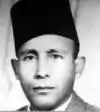Ahmed Bahnini
Ahmed Bahnini (Arabic: أحمد بحنيني; c. 1909 – 10 July 1971) was a Moroccan politician who served as the 4th Prime Minister of Morocco from 1963 to 1965 under King Hassan II.[1][2] He also served as President of the Supreme Court.[3] Bahnini was killed during a failed coup attempt against Hassan II on 10 July 1971.[4]
Ahmed Bahnini | |
|---|---|
أحمد بحنيني | |
 | |
| Prime Minister of Morocco | |
| In office 13 November 1963 – 7 June 1965 | |
| Monarch | Hassan II |
| Preceded by | Hassan II |
| Succeeded by | Hassan II |
| Personal details | |
| Born | 1909 Fes, Morocco |
| Died | 10 July 1971 (aged 61–62) Rabat, Morocco |
| Political party | Front for the Defence of Constitutional Institutions |
Early life
Ahmed was born in Fez, Morocco in 1909. He studied at the University of Al-Karaouine, where Abdeslam Serghini was his professor.
Career
He was teacher to the princes - including Moulay Hassan (future Hassan II) - and princesses at the Imperial College after having held positions at the Méchouar (secretary to the central Makhzen and judge at the herifian High Court).[5]
Ahmed Bahnini was appointed prime minister by Hassan II in 1963, a week before the promulgation of an amnesty dahir and rehabilitating well-known "collaborators" to the chagrin of the nationalists. This man, at the time of the deposition of Mohammed V had said nothing and had rallied to Mohammed Ben Aarafa, the sultan placed briefly on the throne by the French.[6]
In a speech delivered on 7 June 1965 in Rabat, Hassan II proclaimed a state of exception, in accordance with article 35 of the Sherifian Constitution, and announced a revision of this Constitution, which would be submitted to referendum. Bahnini later presented the king with the resignation of the members of the Moroccan government. The MAP news agency said that the speech of Hassan II was welcomed with "satisfaction" by the population, while the opposition Istiqlal Party and UNFP disapproved of the measures taken by the sovereign.[7]
Death
On 10 July 1971, during a celebration of Hassan II's birthday in Skhirat palace, Bahnini was shot dead when mutinying soldiers fired into a crowd of guests during a bloody and unsuccessful military coup attempt.[4][8][9][10]
References
- "Governments and Politics". Moroccan British Society.
- "History of Governments". Maroc.ma. 16 April 2013. Retrieved 5 May 2022.
- "King of Morocco Appoints Premier; Replaces Early Nationalist". The New York Times. 14 November 1963. ISSN 0362-4331. Retrieved 5 May 2022.
- "1971: Death for Moroccan rebel leaders". BBC. 13 July 1971.
- Arabies (in French). Arabies. 1988. p. 31.
- "Les Premiers ministres et Chefs de gouvernement marocains depuis l'Indépendance". LesEco.ma (in French). 11 September 2021. Retrieved 5 May 2022.
- "Hassan II met un terme à son expérience de monarchie parlementaire Le gouvernement Bahnini a remis sa démission". Le Monde.fr (in French). 9 June 1965. Retrieved 5 May 2022.
- ReneNaba (7 July 2020). "Le coup de Skhirat, cinquante ans après. 1/2". Libnanews, Le Média Citoyen du Liban. Retrieved 5 May 2022.
- "La liste des victimes". Le Monde.fr (in French). 15 July 1971. Retrieved 5 May 2022.
- Chennani, Rachid (4 April 2018). "Human Rights and the State in Morocco: Impact of the 20 February Movement". Arab Reform Initiative.